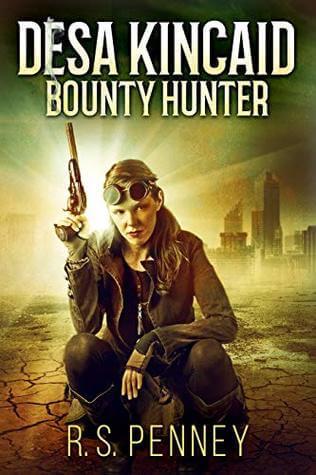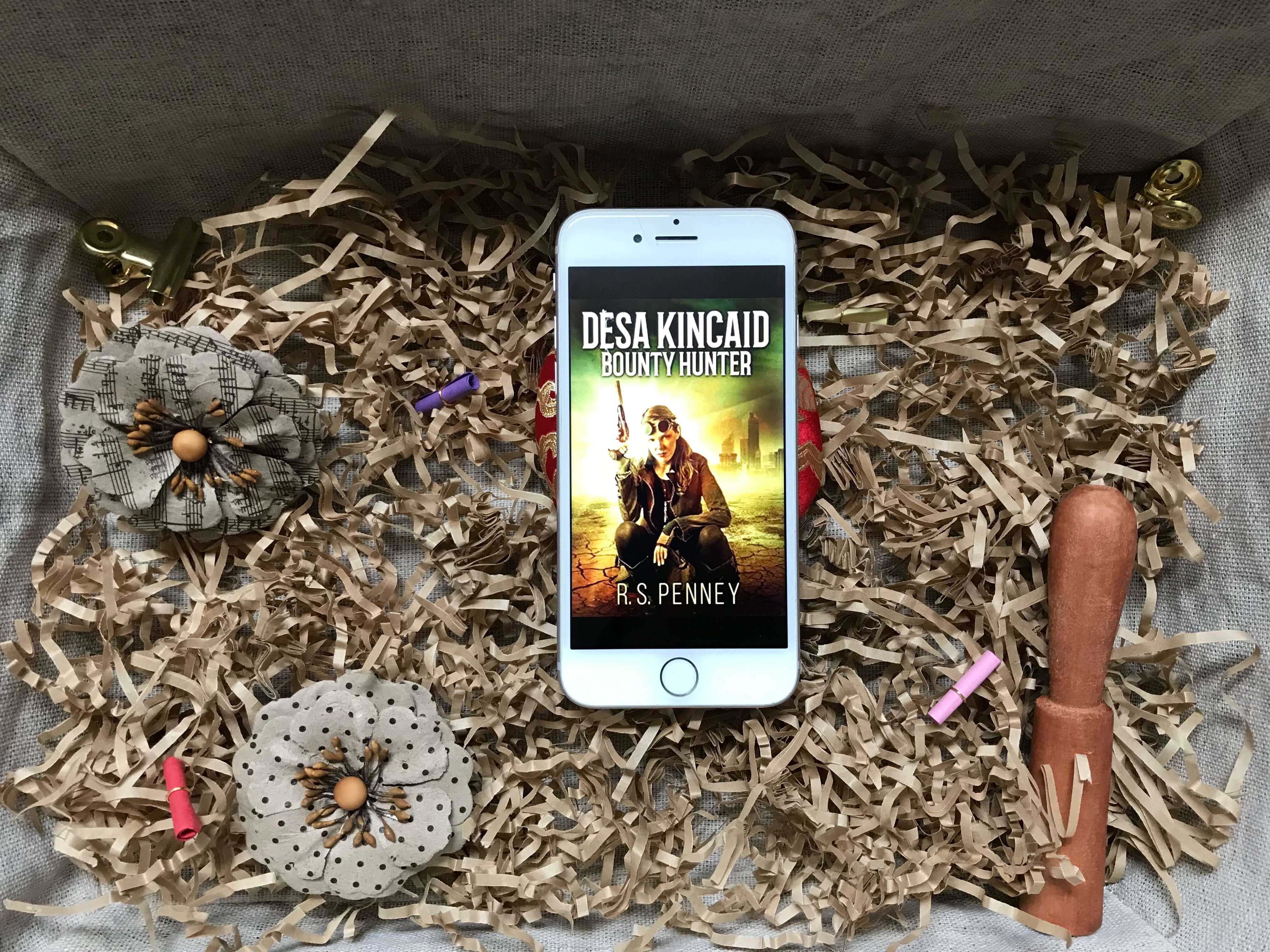

In Desa Kincaid Bounty Hunter, Rich Penney introduces us to Desa. She has been travelling the world in pursuit of one man. She isn’t always welcomed to towns because of her powers that most people do not understand, but she does not let that waver her. She is a powerful character who inspires others around her and does not see her powers as anything special. She believes anyone can learn them if they have the chance.
I wrote extensively about Desa in my review and now it is time to talk about her creator, Rich.
My curiosity about Desa Kincaid
- Where did the idea of Desa Kincaid come from? Is there someone in your life that she is inspired by?
Desa started off as a tandem story on Theoryland.com. That was back in the fall of 2007. So, she’s been around for a while now. I’d say that there isn’t someone in my life that she’s based on, except Anna would protest that because Anna lives rent-free in my head. As far as she’s concerned, that counts as being in my life. Anna is one of the lead characters from the Justice Keepers Saga. When I first created Desa, she had a lot in common with Anna.
At the time, I was pretty heavily inspired by V for Vendetta. Desa was kind of a dark, pissed-off, version of Anna. I’ve since made some changes to make her into her own distinct character.
For one thing, I got rid of the anger. Instead of Desa being a white woman, I turned her into a woman of colour. So, the anger had to go because that plays into way too many stereotypes. I made her more eloquent, more worldly. I made her older; she’s thirty whereas Anna starts the story at twenty. A little less idealistic, a little more grizzled. I made her a lesbian for several reasons. One is representation, but another is that I’ve written straight romances many, many times and I wanted to step outside of my comfort zone.
- Tell me more about the concept of the Ether.
Think of the Ether as a protective barrier that separates Desa’s universe from the formless chaos beyond it. It’s accessible to pretty much any living creature with a mind complex enough to understand it. You don’t have to be born with special powers or anything like that. I’ve always preferred the idea of magic being something that you can study just like any other skill. I’ve never cared for the concepts of wizards and muggles. Or high midichlorians or anything that makes magical talent into a genetic lottery. I find that to be cheap, shoddy world-building. The author needs a convenient explanation for why some people have magic and others don’t; so they decide that magic is something you’re just born with.
And people are really obsessed with that narrative of the hero being from some special bloodline. Look at how everyone has reacted to The Last Jedi and the revelation that Rey’s parents were no one important. All of her power is just natural talent. She’s a savant. It didn’t come from anywhere. It’s all her. That’s really scary to some people.
You might say that the Ether is kind of a pocket dimension, accessible from any point in Desa’s universe. A dimension that contains infinite energy. When you Infuse an object with a connection to the Ether, you are choosing how that energy manifests. It can manifest as heat or light or kinetic force, for instance. You can also drain energy from the physical world and dump it into the Ether. The Ether can accommodate as much as you want. You’re also choosing how the Infused object is triggered. If you give the object a physical trigger – like the coins in Chapter 1 – then anyone can use it as long as they know what that trigger is. If you give the object a mental trigger, then the Field Binder who made it activates it and deactivates it with their mind.
- How is Desa’s story similar or different from your other series, such as the Justice Keepers Saga?
They both have some very elaborate – but very different – fight scenes. They both focus a great deal on interpersonal relationships and emotions. Love, loss, betrayal: all that good stuff. They’re both very fast-paced and easy to read. That’s deliberate. As a reader, nothing annoys me more than navel-gazing. I make it a point to write books that are fun to read, and that remains true even when those books deal with complex political themes.
The Keepers Saga focuses more on politics. There’s not a lot of that in Desa Kincaid. Desa was a reaction to a literary marketplace that was very saturated with what I’ll call “serious fantasy.” Think Game of Thrones. That’s very serious fantasy. “This isn’t just dragons and wizards. This is high-concept art.” And that’s fine. I think that kind of fantasy should exist.
But in the middle of the 2000s, I was kind of fed up with serious fantasy. I felt that the genre was kind of getting up its own ass. Taking itself way too seriously. I just wanted a story about characters going on an adventure in a strange, fantastic world. And you can do some thought-provoking stuff with that. For instance, there’s a scene where Miri teaches Tommy about misogyny, and the book is very critical of homophobia and the anti-science attitudes that seem to be making a comeback in our society. All high-concept themes, but at the end of the day, this book is about having fun.
- You mention on your Goodreads page that you advocate for the poor, environmental sustainability, for minority rights. We see these themes in Desa Kincaid as well, especially when she takes Tommy under her wing. What role does writing play in helping you achieve/pursue/connect with these life goals?
Well, I do make it a point to include a diverse cast of characters so that people who don’t always get to see themselves portrayed in epic fiction have protagonists that they can relate to. I try my best to make that as authentic as possible.
I also like to challenge my readers to think. So, when Tommy learns that his boyfriend hates Desa simply because Desa is a powerful woman, teenage boys can read that and think, “Do I want to be like this guy?”
Some people tell me that I’m very overt about my politics.
I’ve noticed that, when it comes to politics, there are two kinds of authors. The first tries to make you think by deliberately making you work to figure out what they’re trying to say. Some people call this being subtle. I’m not subtle. The second kind of author is the kind who will tell you flat out how they feel about a certain issue, and this also makes you think. Because as a reader, you ask yourself, “Do I agree with this? Did the author make a compelling argument for the position they’re taking here?”
I try to challenge people to think about police violence (Relativity), right-wing populism (Dirty Mirror) or the way that society treats women and queer people (Desa Kincaid: Bounty Hunter) And maybe you disagree with my stance. That’s fine. But I’m not gonna tiptoe around it. I’ll tell you what I think and let you decide for yourself.
- Where will Desa’s adventures take her next? Have you already started on Book 2?
Well, here’s a minor spoiler: she will be going back to the haunted city. I haven’t started Book 2 yet. The working title for that one is Desa Kincaid: Bullets and Bones. That one will probably be coming out sometime in 2021, however, I may move up my timetable if Bounty Hunter gets a lot of positive attention. Give the people what they want, and so forth.
- What are some books that you would recommend to your readers who loved this novel?
Am I allowed to say Symbiosis? Haha! Seriously though, if you enjoyed Desa Kincaid, there’s a very good chance that you’ll love the Justice Keepers Saga. They’re very similar. But since I want to go beyond shameless self-promotion, any fan of Desa Kincaid needs to check out Brandon Sanderson’s Mistborn Trilogy. Brandon is an amazing author with some truly unique fantasy worlds and some very compelling characters. Five stars all around.
My curiosity about Rich Penney’s writing routine
- What inspired you to become a writer?
Being a writer wasn’t something I chose. It’s hardwired into me. My brain churns out stories. I have to write them down. If I don’t, I start to think suicidal thoughts.

- How do you select the names of your characters? Are they just names that appeal to you, did you look them up for a special meaning?
I picked Desa Kincaid because it sounds cool. The “Nin Leean” (Daughter of Leean) came because when I made her a woman of colour, the surname Kincaid didn’t really fit. That’s a very Irish name. But I really liked the name Desa Kincaid. It just sounds so bad-ass. So, I invented a backstory as to how she got that surname.
The two oldest characters in the Justice Keepers Saga are Jack Hunter and Anna Lenai. I created them all the way back in 1998. With Jack, I wanted a J name. I just thought J names sounded cool. That’s usually the motivation behind every name I choose. It took me two years to choose a last name for him. I finally buckled down, opened my e-mail contact list and tried out every last name until I found one that sounded right to me. I eventually settled on Hunter. (Hi, Nicole! If you’re reading this, yes I named Jack after you)
Anna’s original name was “Lily.” I changed it because that name holds some emotional significance for me, and I didn’t want people asking me why I named her Lily. In Quenya, the high elvish language of Middle Earth, the word anna means “gift.” I chose it for that reason. Her last name, Lenai, came to me when I was sitting in a cafe in the spring of 2001, listening to my creative writing teacher play guitar.
I tend to choose names because I like the way they sound.
- Are there any books that you would say influenced and shaped you as a writer?
The Hobbit. It was the first big novel I ever read, and I loved it. Mistborn by Brandon Sanderson. I was already doing elaborate fight scenes way before I ever heard of Brandon Sanderson, but seeing his work in print convinced me that reputable publishers would buy books that featured elaborate fight scenes. When I was growing up, no one did that in print.
The Great Hunt by Robert Jordan. It’s kind of the paragon of traditional epic fantasy. It has a lovable main character who you can connect with. It puts him through some hard times, forces him to make some difficult decisions. And the thing that makes it work is that Rand al’Thor has this unshakeable moral centre. I appreciated that.
The Tenant of Wildfell Hall. That was required reading in my first year of university, but it’s such a powerful story about a woman who escapes an abusive relationship. And it was published back in 1848.
There are probably others, but I could go on all day about books if you let me.
- What would you tell your younger self when it comes to writing?
Stop throwing out manuscripts. Just finish something! A crappy book that you actually release is better than an awesome book that you never finish. You can thank a YouTuber called Thought Slime for that sentiment.
So here was a sneak peak into Desa’s world as well as Rich’s. Hope you enjoyed it!
Desa Kincaid Bounty Hunter is now available in stores. My thoughts on it can be found here. 🙂
Amazon Kindle Amazon Paperback

Cover Photo by pina messina on Unsplash
Writing desk Photo by Clark Young on Unsplash

Be First to Comment